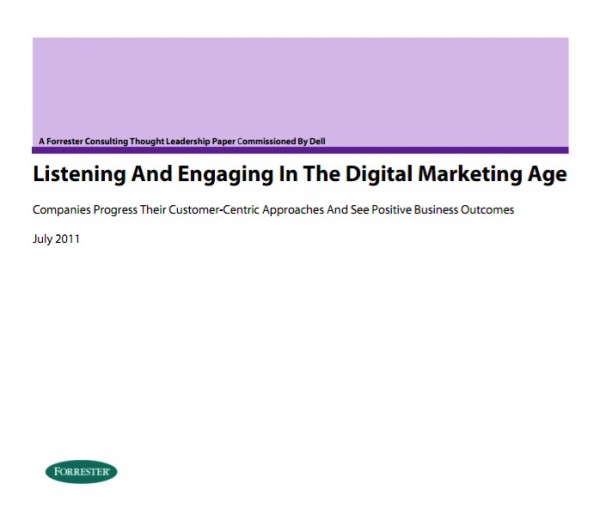“Listening and Engaging in the Digital Marketing Age” - a report, from Forrester.
 The full report from Forrester, commissioned by Dell, is available to read and download from Dell's micro-site, which is here, the up-shot is that companies that launch listening and digital engagement initiatives are rewarded with improved customer satisfaction scores, loyalty and brand metrics.
The full report from Forrester, commissioned by Dell, is available to read and download from Dell's micro-site, which is here, the up-shot is that companies that launch listening and digital engagement initiatives are rewarded with improved customer satisfaction scores, loyalty and brand metrics.
Only 50% of companies surveyed (US sample) feel that social media is a core function in their business, however they do feel that their efforts are serious despite only 6% of companies saying that their social media functions are very integrated in the business.
“Listening and responding to customers is so basic and fundamental. The emergence of social media elevates how companies can act on the feedback they get from customers,” (Karen Quintos, senior vice president and Chief Marketing Officer at Dell)
We've read and summarised the key findings in the report below:
- Social media is gaining ground as an important tactic for listening and learning from customers, to the extent that social KPI's are seriously monitored as a part of a social strategy, 76% of companies are also distributing important customer feedback within their organisation. The listening gets measures and used.
- Social media initiatives have a corporate value across the whole organisation from customer services to product development. By virtue of by embedding social media listening within the business and then using that customer insight, companies are experiencing benefit through improved efficiencies across marketing, sales and customer services.
- Industries do it differently, across the three industries questioned social media is used with varying priorities including customer services, reach or awareness building and lead generation. The report notes that 31% are enhancing sales by offering incentive programmes for customers who engage online, including deals and discounts.
- Companies are deepening the use of social media, 64% of respondents are incorporating customer feedback into products or services, they're also working with custom communities and bespoke incentive programmes. The opportunity for a more evolved social businesses, however, is to move on from product and service based interactions to relationship based.
- Spend on social media is increasing, overall businesses see social media is an important place for growth, a means to add more value to their customer relationships. Despite this companies are not keeping abreast of the pace of cultural change, as empowered consumers that are ignored by most interact with each other instead of using the established, company-centric information pathways.
- There's a lot of opportunity to do more, many companies have challenges to overcome, such as measuring customer insights and tying social media initiatives to corporate objectives, before they can really maximize results.
“I believe the greatest benefit has been that our customers who use social media and interact with our efforts see us as a more progressive company because we are using multiple channels for communicating.” (Marketer at enterprise banking company)
Where to start?
Assuming you're in the majority where social media usage is pretty limited to one or two key techniques, Forrester gave their advice on where to start:
- Set a premium where efforts can really impact commercial change, based on Forrester's previous comments these would be product based interactions that can influence sale. The most obvious Examples may be simply a useful and active social FAQ to aid in purchase decisions or employing Uservoice or Get Satisfaction to crowd-source product development ideas. It doesn't need to be complicated to demonstrate immediate, commercial benefit.
- Listening to and learning from customer conversations is important, as is the ability to dip into those conversation where they might matter most. Resources are tight for all of us, I think Forrester are suggesting that we focus our attention and efforts on where an influential person (maybe a blog), or an influential conversation (maybe a few people debating something on an important forum or social network), are already active. The conversations with opportunity are likely where there is already interest and attention.
What do you think - does your experience marry with the research or do you have a different take?



 The full report from Forrester, commissioned by Dell, is available to read and download from Dell's micro-site,
The full report from Forrester, commissioned by Dell, is available to read and download from Dell's micro-site, 


